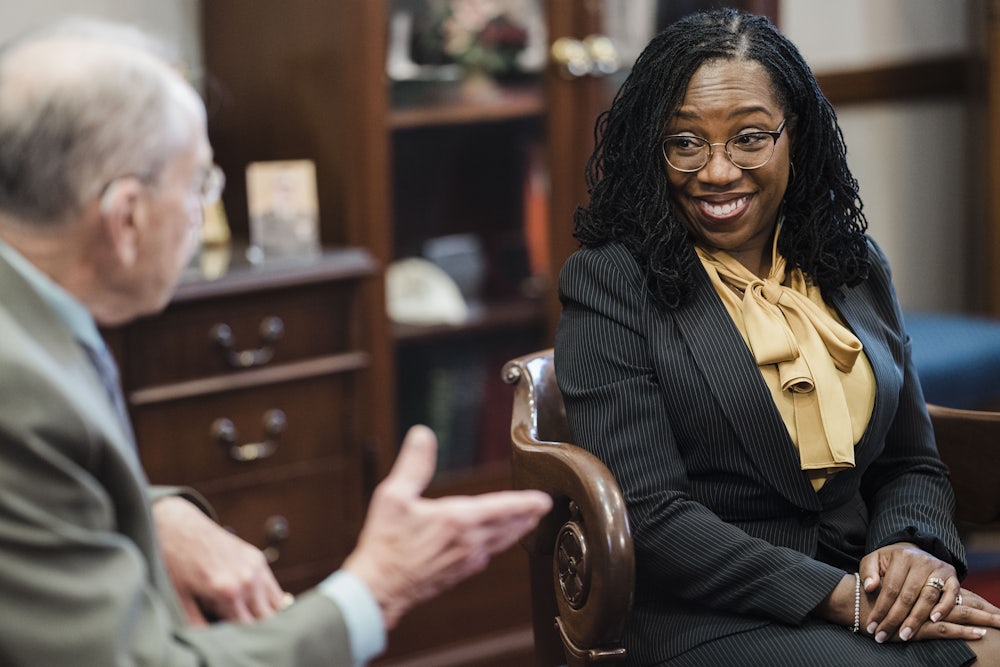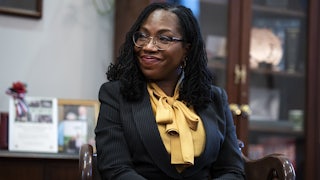Judge Ketanji Brown Jackson, the first Black woman to be nominated to the Supreme Court, has made her rounds at the Capitol, a charm offensive all nominees undertake. It gives each relevant senator a chance to ask questions and formulate how they will approach the confirmation hearing and provides a personal opportunity to assess the nominee on her merits. To say she is highly qualified is an understatement, but in today’s political environment, that means little, even after she was confirmed three times, twice for federal court appointments. In fact, Republican Senator Lindsey Graham, who just a year ago voted to confirm Jackson to serve on the federal Court of Appeals in Washington, D.C.—one of the nation’s most coveted federal appointments—has already signaled his opposition. Will the first Black woman to be nominated experience an unfair double standard? She already has. But there is time to correct it.
The double standard began before Jackson’s nomination. As two opinion writers have pointed out, just a year ago, during Jackson’s confirmation hearing for her appellate court appointment, GOP Senator John Cornyn of Texas asked her a question no white man would have been asked. He asked Jackson what role race might play in her rulings. Last I checked, while race has no biological or anthropological meaning, in a society built on it we all have one. Therefore, Jackson is not the only nominee who has a race. If every nominee was asked if their race would play a role in their decisions, then it would not be a double standard. Cornyn voted against Jackson last year despite her providing the answer he no doubt wanted to hear. Race plays no role in her decisions.
Jackson was attacked before we even knew she was the nominee, as all possible Black women nominees were. In a racially polarized society where Black history and novels are under attack, it is not surprising that the president’s promise to nominate a Black woman was, too. But it was also a double standard. President Biden’s press secretary, Jen Psaki, piercingly pointed to it. No one attacked former Presidents Ronald Reagan or Donald Trump for pledges to appoint a woman. That point alone, along with Cornyn’s question, shows that Jackson is already being treated differently. Every woman we knew Biden to be considering was clearly qualified to sit on the Supreme Court, in terms of their credentials.
After Jackson’s nomination, Graham oddly claimed that “the radical Left” had won, as if she were a fringe nominee. Her record, which Graham knows well because he voted to confirm her to the most important federal appeals court in the country, doesn’t support that label. It is not a statement that reflects who Jackson is. It is also odd behavior given his voting history of support for Justices Elena Kagan and Sonia Sotomayor.
To be sure, we could just chalk this up to the more polarized nature of the nominations process. After all, Merrick Garland was denied even a hearing back when Barack Obama nominated him in 2016, despite Republican senators having expressed support if he were to be nominated. Jackson has also received scrutiny because traditionally, the “get tough on crime” crowd are skeptical of people who have served as public defenders. The Cato Institute reported in 2019 that among Trump judicial appointees, prosecutors outnumbered defense attorneys 10 to one. Of course, Justice Neil Gorsuch had been a private law firm white-collar criminal defense attorney. That didn’t seem to disqualify him. The Fraternal Order of Police’s endorsement of Jackson may have surprised Graham and other Republicans.
Any nominee is expected to receive scrutiny, particularly from the party not in power in the White House. But too many are willing to use race to drive fear. Our experiences differ, and experience shapes our understanding of the facts and how decisions will play out for real people. That matters if we are to see our constitutional rights protected. Ruth Bader Ginsburg was the only woman on the court when the case of a 13-year-old girl who had been strip-searched in an Arizona school came before it. Some of the justices were minimizing the girl’s lasting humiliation. Ginsberg voiced her concern for the girl’s well-being. She later told USA Today that her male colleagues “have never been a 13-year-old girl.” They were not intentionally insensitive, but they didn’t know what they didn’t know.
Perhaps it is for this reason that we have a history of bipartisan support for historic nominees, as journalist Sophia Nelson has pointed out. In 1967 Thurgood Marshall, the first Black justice, received 32 Republican votes. In 1981 Sandra Day O’Connor, the first woman, received unanimous support from Democrats. Even Sonia Sotomayor, who came along in our more polarized time and who was excoriated by some for talking about “wise Latinas,” received nine Republican votes. That was 2009. In 2022, we are hoping for two or three, for a nominee who deserves bipartisan support for her credentials, intelligence, experience, integrity, and compassion.
In terms of qualifications to sit on the Supreme Court, we have always had many more qualified people of all backgrounds than seats they can fill. But that has not produced a more representative court. We have differing perspectives on how far the United States has come on equality. One thing that should trouble us, no matter our perspective: Out of 114 Supreme Court justices in our nation’s history, all but seven have been white men. No Black woman has ever been nominated to the Supreme Court, and only about 3 percent of sitting federal judges are Black women. Unless we were to believe that no Black women has ever been qualified, a view that falls within the formal definition of racism, then we have to examine why qualified Black women are not considered.
Book learning and job experience are part of the background that we examine for qualifications. We also look for integrity and a temperament for the bench. If we were hearing legitimate questions about any of these, I would not call my concern a double standard. But in this case, the concerns raised go more directly to projecting assumptions about Jackson that have little to do with these legitimate areas of inquiry.
From what we have seen of Jackson so far, including in her earlier confirmation hearing last year, her remarks at her nomination press conference, and her reputation on the bench, she is thoughtful, considered, and fair. I am sure that is what senators observed in their meetings with her. It will be interesting to hear what questions they ask and the extent to which they are consistent with an analysis of her qualifications, character, and temperament. Senators can model a confirmation hearing that treats Ketanji Brown Jackson fairly and on her merits. They are impeccable.








